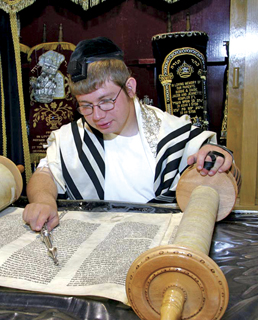Building abilities awareness in the Chicago Jewish community
Permanent link All Posts
A congregant with special needs reads Torah on Shabbat.
In 1987, Ronald Reagan authorized a Presidential Proclamation, designating March as "Developmental Disabilities Awareness" month.
In light of the former president's national initiative, the Jewish community is now taking the lead in realizing a vision of heightened sensibility toward those with mental and physical disabilities. Keshet, a non-profit organization dedicated to personal, religious, and communal growth for the developmentally disabled, is introducing "Abilities Awareness Shabbat," a program geared toward Chicago area synagogues, temples, and shuls, to be held on the first Shabbat in September as a way to launch into the High Holiday season.
Abilities Awareness Shabbat is concurrent with a similar program instituted by Congregation Beth Shalom in Northbrook. Recognizing the need for inclusion in the community, the synagogue planned a hands-on Rosh Hashanah service based around accessibility for disabled members. Featuring easy entrance and exit to the synagogue, a picture-based prayer book, and opportunities to touch the shofar, participants will worship together in an accessible, inclusive, and sensitive environment.
Soon after Beth Shalom conceived the service, its staff contacted Keshet's Leventhal Professional Development Center, drawing attention to its efforts to showcase awareness of disabled congregants. Leventhal, which produces a growing corps of educators and professionals to teach methods for working with the special needs population, drew further inspiration from Beth Shalom's Rosh Hashanah program in creating Abilities Awareness Shabbat.
Rabbis are the target educators for the September service. They are urged to foster a discussion about the acceptance of individuals with developmental disabilities and their right to feel welcome in synagogues, temples, and shuls in the Chicago area. "The rabbinical community of Chicago is very accessible, caring, and addresses a variety of community needs," said Susan Levin-Abir, director of Strategic Development at Keshet. "We appreciate its incredible commitment and generosity of spirit in helping create an inclusive environment for those with special needs."
Keshet will give rabbis free consultation and information on how to provide abilities awareness for the Shabbat service, but they can choose how to participate.
In addition to communicating to congregants the need for acceptance of the disabled in the sermon, rabbis may reach out to families and invite parents of a child with special needs to speak at the service about being part of the synagogue and what it means to their family. Encouraging members to start a buddy group, through which a family with a disabled child is paired with another family and go to synagogue and attend community events together, is a great way for rabbis to start a trend of inclusion. For parents with special needs children unable to sit through an entire Shabbat service, rabbis can create an option for them to attend part of the Shabbat ceremony and participate in activities outside the sanctuary for the remainder of the time.
Abilities Awareness Shabbat will be educational for congregants who have felt uncomfortable in the presence of disabled individuals during services or seen them as a disruption to the flow of worship. "Synagogues need to think consciously about addressing being comfortable around people with disabilities," said Rabbi Michael Balinsky, executive vice president of the Chicago Board of Rabbis. "It's a moral obligation for congregations to face and do."
Though primarily a rabbi-driven affair, Abilities Awareness Shabbat needn't end with the sermon. Congregants are encouraged to start dialogue targeting acceptance of the developmentally disabled that transcends the one September Shabbat service. Keshet will also provide opportunities for synagogue members to volunteer at area non-profits servicing people with special needs. This is an activity they can take advantage of in September and throughout the year.
Abilities Awareness Shabbat opens the door for Jews to recognize that developmentally disabled individuals are able to fit right in to their communities.
"Jewish tradition shows that its people are accepting and understanding of all God's creatures," Balinsky said. "When Moses led the Israelites out of Egypt, people of all types were present. This is why embracing people with disabilities to include them in the synagogue is a defining commitment."
Abilities Awareness Shabbat will be held on Saturday, Sept. 1. For more information about how to be involved, visit www.keshet.org/content/rabbis-abilities or contact Susan Levin-Abir at (847) 205-1234 or susan@keshet.org.
Keshet is a partner in serving our community, supported by the JUF/Jewish Federation of Metropolitan Chicago.
The Chicago Board of Rabbis is a partner in serving our community, supported by the Jewish United Fund/Jewish Federation of Metropolitan Chicago.



.jpg)



